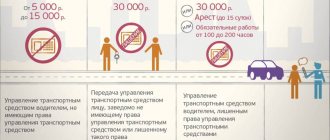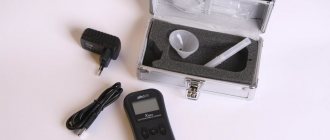Home/Deprivation of a driver's license/Deprivation of a driver's license for non-payment of child support in 2021
It is not uncommon for a former spouse to refuse to financially support their minor children who are left in the care of only one parent. The state seeks to influence such malicious alimony debtors by applying various measures and constantly expanding their list.
Attention
In 2021, there is an opportunity to motivate the child support worker - if he has a large debt, he may lose the right to drive a vehicle!
Can a driver's license be revoked for failure to pay child support?
Yes, since the entry into force of Federal Law No. 340-FZ, this is a fact - now you can actually lose your driver’s license for non-payment of alimony. This procedure is initiated by an appropriate executive document, for example, a corresponding court decision. This is a kind of license for a bailiff, who begins to act on the basis of this paper.
Attention! If you have any questions, you can chat for free with a lawyer at the bottom of the screen or call Moscow; Saint Petersburg; Free call for all of Russia.
Reasons for applying this measure
The above-mentioned Federal Law states that the reason for deprivation of rights may be failure to fulfill the obligations specified in the writ of execution or untimely payment .
Data regarding the size or existence of debt can be found by contacting the bailiff, both for the debtor and for the collector.
Administrative punishment is applied if evasion of alimony payment on the part of the debtor is proven.
ATTENTION! However, drivers should not always be afraid of losing their rights, since if the amount of the debt is less than 10,000 rubles, then it is impossible to take them back by law.
Also, the rights will remain with the debtor if he was not notified of the debt in the required manner.
The bailiff is required to notify the debtor by letter with a postal notification of delivery or, at a personal meeting, to hand over to the debtor the Resolution to initiate legal action. production.
Also, the FSSP employee is obliged to conduct a conversation with him and obtain a signature that the defaulter has been informed of the administrative and criminal liability provided for by the Law for non-payment of alimony.
There are a number of other reasons in the presence of which the rights of a defaulter cannot be taken away on legal grounds.
Conditions for deprivation of a driver's license for non-payment of alimony in 2021
Art. 67.1 of Federal Law No. 229 provides for the following factors influencing the decision on the need to deprive an alimony debtor of a driver’s license in 2021:
- The amount of alimony debt is 10 thousand rubles (Article 1, Clause 4 of the Federal Law - No. 340).
- This is a threshold level; if the debt is less, the driver’s license will not be confiscated.
- The alimony payer deliberately refuses his obligations, that is, he is aware of the existence of the debt, and at the same time he does not have any valid reasons for allowing it (neither illness nor financial difficulties).
How to find out about debts?
Often payers do not even have information about the exact amount of the debt and the enforcement proceedings initiated against them. In relation to alimony, this is possible when the payer does not work anywhere, and at the same time is not officially unemployed, believing that collection is not being made. In reality, the bailiff calculates alimony based on the average earnings in the region, which leads to a rapid increase in the amount of debt.
Having access to the Internet, you can check the existence of debt for which enforcement proceedings have been initiated. Use special services for this by going to the official portal of the FSSP or State Services.
Who cannot have their driver's license revoked?
Not every child support debtor can have their driver's license revoked in 2021. If he meets the following conditions, then he need not fear for his document:
- the amount of alimony debt is not higher than the threshold of 10 thousand rubles;
- a deferment or installment plan has been officially granted to repay the debt;
- the main activity from which he receives income is impossible without driving a vehicle (for example, a child support worker works as a taxi driver or is engaged in cargo transportation);
- the debtor’s car is the only way of transportation on which his life depends (for example, the child support worker lives in a remote area where the transport infrastructure is not developed);
- the debtor is disabled;
- supports a disabled person, whom he transports in his vehicle to places of treatment;
- is wanted, so it is not possible to serve him with a restrictive order.
To confirm the fact that the alimony worker cannot be confiscated in 2021, he must have the appropriate documents with him, for example:
- a bailiff's certificate confirming the amount of debt;
- court order to defer or installment plan;
- certificate of his disability.
The procedure for restoring rights after deprivation of alimony
- As soon as the debt is repaid, the bailiff service must be notified about this using supporting documents. This can be a receipt if cash is received, but this cannot be done without the presence of a bailiff or notary. And also the money can be transferred to the plaintiff’s bank card, which is confirmed using an extract.
- If the state has assumed the obligation to compensate for alimony debt, then payment to the treasury must be confirmed by a receipt, the correctness of which is monitored. The main thing you need to pay attention to here is the amount being deposited and the UIN (unique accrual identifier), which now identifies the payment and the offense. If the document is not filled out correctly, the payment will be lost, the database will not receive information about the execution of the court order, and it will take time to restore it.
- As soon as the documents are checked by the bailiff, he will remove all restrictions with the help of the next decree.
- The traffic police authorities are the first to notify about the lifting of restrictions.
- The defendant is required to receive one of the copies of the resolution lifting the driving ban.
- It is advisable that at first this resolution be in the defendant’s car for presentation to traffic police inspectors. Even if the bailiff promptly acts, transmitting information about lifting the ban to the relevant authorities, this does not mean that some link in the chain of information transfer will not fail. And such important information in the driver’s life will not reach its destination on time.
It is worth considering that not only arrears of alimony, but also some other unpaid fines from the traffic police or compensation awarded in criminal cases can affect the suspension of the right to drive a vehicle. If the debtor has a credit debt or a debt for paying utility bills, then at least for now these categories are not included in measures that provide for the suspension of a driver’s license.
In the video below, watch how bailiffs deprive a driver’s license for child support obligations:
Last update: 03/28/2021
Normative base
Federal Law No. 340-FZ made significant changes to various legislative acts, including the law on enforcement proceedings. Among other things, these amendments expanded the list of actions that a bailiff is authorized to perform to influence a debtor in 2021. Now they can restrict the debtor’s right to drive vehicles (not only cars, but also motorcycles, mopeds, quadricycles, etc.).
Among other regulations, this law introduced amendments to Art. 67.1 of Federal Law No. 229-FZ, which discloses temporary restrictions on the debtor’s use of the right to drive a car.
What are the consequences for the defendant if he fails to comply with the instructions?
When a debtor violates the legislation on enforcement proceedings in the form of ignoring the demands of the bailiff, he, on the basis of the provisions of Art. 17.14 of the Code of Administrative Offenses is subject to penalties in the following amounts:
- for individuals – 1-2.5 thousand rubles;
- for individual entrepreneurs – 10-20 thousand rubles.
According to the rules of Art. 17.17, in case of failure to comply with the requirement to suspend the right to use a vehicle, the violator may be:
- sent to compulsory work for a period of up to 50 hours;
- deprived of rights for a period of up to 1 year.
According to the instructions of Art. 12.7, if a person gets behind the wheel without having the right to do so, he will be fined in the amount of 5 to 15 thousand rubles. The exception is training driving.
If the vehicle is driven by a person deprived of his license, he faces one of three penalties:
- a fine of 30 thousand rubles;
- arrest lasting up to 15 days;
- compulsory work assigned for 100-200 hours.
A person who has transferred control of transport to someone who does not have the right to do so or has been deprived of it faces a fine of 30 thousand rubles.
Procedure for depriving a driver's license for non-payment of child support
The law amending the procedure for influencing debtors gave bailiffs the right to initiate a procedure for depriving a driver’s license without first going to court. To apply such a measure of influence there must be grounds:
- the relevant writ of execution;
- presence of large debt.
The procedure for depriving a driver’s license for failure to pay child support in 2021 involves the following steps:
- Sending a written notice to the debtor, where he is invited to voluntarily repay the debt within 5 days from the date of receipt of this document. Otherwise, administrative measures will be taken against the alimony provider.
- If, after this period, the debt remains with the payer, the bailiff issues a decision to bring the debtor to the promised administrative liability. He sends copies of the resolution to the following persons: - the payer; - the recipient of alimony; - the traffic police authority, which enters the information received into the database.
- Now the alimony debtor is deprived of the right to drive a vehicle, even if he has a driver’s license in his hands.
Please note:
The procedure for depriving a driver's license becomes more complicated if the debtor is located in one city and the recipient is in another. Since the powers of the bailiff are limited geographically, and the recipient addresses him at his place of residence, it is necessary to redirect the case to the place of residence of the payer.
If the bailiff is in no hurry to apply this measure of influence, the recipient of alimony can motivate him. In 2021, you need to act as follows:
- Come to the territorial office of the FSSP strictly on the reception day. It is important to find out in advance what hours the bailiff receives private individuals, since he may refuse to speak at odd hours or simply be absent.
- Orally explain the situation to the bailiff, present evidence (for example, a bank statement from your personal account, which shows the absence of financial contributions from your ex-spouse).
- Submit a written application to hold the alimony provider accountable in accordance with Art. 67.1 No. 229-FZ.
- The bailiff is given 10 days to consider the application and take measures to implement it.
- Make a follow-up visit a few days later to inquire about the progress of your case.
If, immediately after the divorce, the former spouses entered into a voluntary agreement on the payment of alimony in the presence of a notary, this means that the bailiff cannot have in his hands a writ of execution ordering mandatory payments. In this case, the recipient demanding repayment of the debt must apply directly to the court with a statement of claim or entrust this to the bailiff by first visiting him.
List of documents for filing a claim
Decrees of bailiffs are appealed by citizens according to jurisdiction to the district court. This court must be located at the location of the bailiffs department on whose staff the defendant is.
The reasons for disputing are usually:
- Imposing restrictions on a citizen from whom the bailiff, by law, cannot take away his driver’s license.
- Violation of the requirement for personal delivery of the order to the debtor.
Once the alimony payer receives a decree that violates his rights, he must act very quickly, since he only has 10 days to file a claim. A sample application to the court is here. When drawing up an application, it is necessary to correctly write all the details of the decision being appealed and provide all the arguments proving its illegality.
The following documents usually serve as attachments to the claim:
- Resolution on suspension of a driver's license.
- Resolution on initiation of enforcement proceedings.
- Evidence showing the illegality of the decision, for example, a medical certificate of disability; debt calculation (if the debt is less than 10,000 rubles); an employment contract or work record book, which confirms that the plaintiff works as a driver; a court decision to release the plaintiff from paying alimony debt.
- Document confirming payment of the duty.
At the next stage, the plaintiff should proceed to pay the fee. Details must be obtained from the court’s website on the Internet. The fee can be paid at any bank, through Internet banking, through electronic money or through the State Services website.
A claim can be filed in 4 ways:
- Deliver the documents in person.
- Submit electronically through State Automated System “Justice”.
- Send by mail.
- Transfer through a representative by proxy.
If the case is not classified as complex, then its proceedings will not take more than 10 days after the court receives all documents. In rare cases, when a complex and complicated case is being considered, the chairman of the district court increases the trial period to 1 month.
Administrative proceedings are convenient for the applicant in that it does not require his mandatory presence in the courtroom during the hearing. Therefore, to win a case, in many cases it is enough to competently draw up a claim and support your arguments with evidence attached to the claim.
Of course, the judge can accept the bailiff’s arguments and refuse to satisfy the plaintiff’s claims. In this case, you need to prepare an administrative appeal within 1 month after the final form of the court decision is made and submit it to the regional court. If the bailiff loses the case, he must cancel the contested decision within 30 days and inform the court and the administrative plaintiff about this.
Sample application for deprivation of a driver's license for failure to pay child support
An application addressed to a bailiff from a recipient of alimony in 2021 must contain the following parts:
- “Header” is a block located in the upper right corner of the sheet and containing the following parts: - position and full name of the addressee; -full name, registration address and contact details of the applicant.
- Title: “PETITION FOR LIMITATION OF THE USE OF THE DEBTOR’S SPECIAL RIGHT.”
- Introduction, which reports the presence of a large alimony debt, the volume of which has exceeded the threshold.
- The request block, which begins as follows: “In accordance with the above, and also on the basis of Art. 67.1 of Federal Law No. 229-FZ I ASK: ". Below is a list of the measures that, in the opinion of the applicant, should be applied to the debtor: - hold him accountable in the form of deprivation of the right to drive a vehicle; -notify the applicant of the measures taken by sending a copy of the decision.
- Date of preparation.
- Signature and transcript.
Applications addressed to the bailiff for deprivation of alimony.
A statement of claim filed with the court in 2021 must contain the following elements:
- “Hat” : a block in the upper right corner with the following components: -addressee: court (you must indicate its full name and address); -plaintiff: here the applicant indicates his full name, contact details and registration address; -respondent: the full name of the debtor and his registration address (if there is a telephone number to which he answers, this must also be indicated).
- Title : “STATEMENT OF CLAIM FOR TEMPORARY LIMITATION OF THE USE OF SPECIAL RIGHTS BY THE DEBTOR.”
- Introduction , where the following information is indicated: - Information about marriage and divorce. - Information about the minor child (or children) for whose maintenance alimony is required. -Information about the conclusion of a notarial voluntary agreement (you must indicate the date of conclusion; the amount agreed upon by the parties; payment deadline). -Description of the situation that the ex-spouse has stopped paying alimony and has accumulated a debt that exceeds the threshold level. - Statement of the request to the court. Here is a statement of the expected result from the trial: a temporary restriction of the debtor’s right to drive vehicles for the period until he fully repays the existing debt.
- List of attachments : -copy of your passport; -copy of the child’s birth certificate; -copy of marriage certificate; -a copy of the divorce certificate; - a copy of the concluded agreement on alimony; -bank statement confirming the termination of cash receipts.
- Date of preparation.
- Signature and decryption.
statement of claim for deprivation of the child support worker's driver's license.
Responsibility for violation of restrictions
The defaulter will not be able to regain the ability to drive independently until the debt is fully repaid. Regardless of whether a person hands over his license to the bailiff service or not, he is prohibited from driving.
Violation of this prohibition may result in additional penalties. Their list is enshrined in Article 17.17 of the Code of Administrative Offenses of the Russian Federation . According to the provisions of the norm, a driver who neglects the rules will be subject to compulsory work for up to 50 hours or deprived of the opportunity to drive a car for 1 year. The choice of punishment will be made by the court.
A driver who neglects existing rules and gets behind the wheel without a license may be subject to other types of punishment. Their list is enshrined in Article 12.7 of the Code of Administrative Offenses of the Russian Federation , according to which:
- Driving a car by a driver who does not have the right to drive a vehicle (except for training driving) entails an administrative fine in the amount of five thousand to fifteen thousand rubles.
- Driving a vehicle by a driver deprived of the right to drive vehicles entails an administrative fine in the amount of thirty thousand rubles, or administrative arrest for up to fifteen days, or compulsory labor for a period of one hundred to two hundred hours.
- Transferring control of a vehicle to a person who obviously does not have the right to drive a vehicle (except for training driving) or is deprived of such a right shall entail the imposition of an administrative fine in the amount of thirty thousand rubles.
Fines are also provided for when catching a defaulter who has been deprived of the right to operate maritime transport. In accordance with the provisions of Article 11.8 of the Code of Administrative Offenses of the Russian Federation , a citizen who has neglected the rules will have to pay a penalty in the amount of 1,000-1,500 rubles , depending on the nuances of the situation.
To avoid punishment, you must comply with the imposed restriction.
Can they deprive their ED for non-payment of alimony without the knowledge of the debtor?
The alimony debtor will definitely be aware of the decree limiting his right to drive vehicles. The law prescribes the need to inform both the payer and the recipient of alimony about this. If the payer believes that his rights cannot be taken away because his life circumstances are covered by law, he informs the bailiffs about this in writing.
Attention
If it is impossible to find out the current location of the debtor, then it cannot be limited in the driver’s license precisely for the reason that the payer must be personally notified of this decision. Therefore, if a bailiff or alimony collector wants to apply just such a measure of influence to him, first he is put on the executive wanted list.
If unforeseen life circumstances arise
It is possible to achieve the return of rights without repaying the debt. The bailiff will remove the imposed restriction if at least one of the conditions established in Part 4 of Article 67.1 of Federal Law No. 229 “On Enforcement Proceedings” . To return the certificate, the citizen will need to report the fact of the occurrence of circumstances to the FSSP, attaching supporting documents.
The return of the right to drive a car in this situation is carried out according to the classical scheme:
- The citizen writes an application to the FSSP and attaches documents confirming the existence of the conditions set forth in Part 4 of Article 67.1 of Federal Law No. 229 “On Enforcement Proceedings” .
- The bailiff examines the essence of the appeal and finds out whether the situation falls under Part 4 of Art. 671.1 229-FZ.
- If there are grounds for lifting the restriction on driving a car, the bailiff informs the traffic police department about the lifting of the ban.
- The license is returned to the driver, and a corresponding note is made in the decision.
In accordance with the provisions of Federal Law No. 229 “On Enforcement Proceedings ,” the restoration of the right to drive a car is carried out the next day after the submission of supporting documents to the bailiff service. In practice, this period may be delayed. Therefore, the driver is recommended to have with him a FSSP resolution confirming the lifting of the restriction. Otherwise, the driver may encounter problems when meeting with traffic police officers.
How to avoid losing your driver's license for failure to pay child support in 2021?
The best way to protect yourself from having your driver’s license revoked in 2021 is to fulfill your responsibilities and prevent the formation of arrears in child support payments. However, the life situation may develop differently; the alimony recipient may lose his job and, along with it, a stable income from which he would pay alimony. In this case, it is reasonable to try to come to an agreement with the recipient, warn about temporary difficulties and try to find a new job as quickly as possible.
Possible exceptions
Such punishment cannot be applied if:
- The amount of debt is less than 10,000 rubles.
- The debtor is maintaining a disabled person.
- The alimony payer was granted an installment plan.
- The defaulter is disabled.
- Loss of rights will deprive the debtor of a source of income - the ability to fulfill debt obligations. In such a situation, bailiffs cannot take away the rights of a person who needs them to work or do business.
- The vehicle is a means of provision for the family of a defaulter living in an area remote from the city with poorly developed infrastructure.
To avoid misunderstandings, the alimony payer should always keep with him proof of one of the mentioned circumstances.
Perhaps you will
Step-by-step instructions for returning your driver's license
A child support payer who has been deprived of his driver's license has the opportunity to restore it and get back behind the wheel. In 2021, this procedure involves the following actions:
- The alimony payer completely covers the debt and presents a supporting document: -receipt; -check; -bank statement; - receipt of the recipient.
- The bailiff, who is given a copy of one of the documents listed above, checks it for authenticity during the day, and then issues a decision to lift the imposed ban on driving. Its copies are sent to the following persons: - the payer; -to the traffic police authority, which enters the received information into the database.
- Now the driver can get back behind the wheel again. However, he is recommended to always have a copy of this resolution with him, since changes to the traffic police database are not made immediately.
Period of deprivation
The storage of seized documents is carried out by the bailiff service, in which a protocol was opened against the violator. Here the rights will remain until the person makes full payment of the debt.
In 2021, a provisional driver's license may be issued. This happens if there are a number of grounds prohibiting the application of a measure against a citizen and deprivation of his driver’s license. If the ban affects the management of maritime transport, a copy of the resolution is provided to the government service responsible for supervisory work.
Appeal against deprivation of a driver's license for non-payment of alimony in 2021
If the debtor's life situation falls under one of the points given above, his rights cannot be taken away from him by law. However, the bailiff or the recipient of alimony may not know about this and send a resolution in his name to restrict the right to drive a vehicle. In this case, the payer must inform the bailiff about such a violation and confirm his words with a written statement, where he confirms the impossibility of executing this decision in 2021. The text of the statement contains the following components:
- “Hat” : a block in the upper right corner, which includes: -position and full name of the addressee; -your full name, registration address and contact details.
- Title : “PETITION FOR CANCELLATION OF THE DECISION ON TEMPORARY RESTRICTION ON THE USE OF SPECIAL RIGHT.”
- Introduction , which reveals the fact of the decision.
- Reference to Federal Law No. 340 and No. 229-FZ.
- A description of your life situation , which falls under these laws and is confirmation of the impossibility of depriving the child support worker of his driver’s license in 2021.
- Request to the bailiff : -cancel the decision made for debts; -send the payer a copy of the new resolution canceling the previous one.
- Attachments : -copy of the previous resolution; - documents that prove a mitigating circumstance.
- Date of preparation.
- Signature and transcript.
Resolution on deprivation of the debtor's rights
The resolution includes:
- an order to hand over a driver’s license to the FSSP within five days if the debt is not repaid during this time;
- clarification of the obligation to comply with driving restrictions;
- warning of administrative liability for failure to comply with the order;
- instructions regarding the fulfillment of obligations;
- information about the need to repay them;
- an offer to submit a document confirming the transfer of debt;
- designation of the period within which the debt must be repaid.
The document is approved by the senior bailiff or the person who replaces him. No later than the next day after acceptance, copies of it are transferred to:
- to the alimony payer in person, by mail or via the Internet;
- their recipient;
- to units of the Ministry of Internal Affairs, the State Traffic Safety Inspectorate or other organizations, depending on the type of vehicle.
When the requirements specified in the resolution are fulfilled or cancelled, the bailiff passes another resolution to lift the restriction. This is done the next day after the debt is paid or the requirements are cancelled, and also requires approval by the senior bailiff or his deputy.
Copies of a resolution or document canceling claims against the debtor (a court decision or a resolution of a person holding a higher position in the FSSP) are sent to the above addressees immediately.
Required documents for appeal
To the response statement that the alimony debtor writes to the bailiff about the impossibility of depriving him of his driver’s license, he attaches documents that confirm his specific situation. The table below tells you which official documents need to be attached in each case.
| Situation | Evidence documents |
| The amount of alimony debt does not exceed 10 thousand rubles. | Certificate of debt indicating the exact amount at the time the resolution was issued. |
| The debtor has been officially granted a deferment or installment plan to repay the debt | A copy of such permit received from the court. |
| The alimony debtor cannot engage in his professional activities and receive income without a driver’s license. | A certificate from the employer confirming his employment and position. |
| The debtor’s car is the only means of transportation on which his life depends. |
|
| The debtor is disabled. | Certificate of disability. |
| The payer supports a disabled person, whom he transports in his vehicle to places of treatment |
|
applications for the return of a driver's license.
Who can't be deprived of their car license for child support?
There are cases provided for by Federal Law No. 229, clause 5, clause 9, art. 67.1, when deprivation of the right to drive a car for alimony cannot be imposed and this includes:
- The amount due for payments is not higher than 10 thousand rubles.
- For the defendant, the vehicle serves as the only means of earning money, i.e. his work is related to freight or passenger transportation. This statement must be supported by a document in the form of a certificate, work book, contract form, certificate of an individual entrepreneur, etc.
- The place of residence of the debtor and his family members is located far from transport routes, and they do not have the opportunity to use public transport to move around. For this family, a car is simply a vehicle with which they get to their place of study or work in order to ensure their livelihood.
- The defendant has a high, I or II, disability group or his child is disabled (here the group does not matter) who needs increased attention.
- The debtor received a temporary deferment from payments for a reason that was of a valid nature, that is, he was on the ballot for quite a long time, was fired, and some other reasons.
Without documentary evidence, none of the above circumstances will be accepted by the judicial authorities. This could be an extract from the employment record, a certificate of disability of the defendant or his child, an extract from a medical center, or any other document confirming the reason for the delay. All copies of these documents, as well as a statement from the defendant, must be handed over to the bailiff.
Arbitrage practice
When the alimony claimant files a claim, the court considers it and sets a date for the trial. Usually it is carried out within 2 months from the date of the claim, but in the context of alimony this period is reduced to 30 days. Before the appointed day, a summons is sent to the payer and the recipient, which indicates the date and time of the trial. Both parties can hire lawyers to represent them in court. The recipient's side will prove that there have been no financial receipts for a long time, and the payer's side will argue that withdrawal of rights is impossible and undesirable, and there must be other means of influence.
If, as a result of the trial, a positive decision is made to confiscate a driver’s license for alimony debts, a corresponding order will be issued in 2021. However, not all is lost here for the payer, because it is possible to submit a request for a deferment or installment plan. To do this, you need to provide fairly strong evidence of the impossibility of payment, for example, a note in the work book about dismissal. Then the court will grant a deferment and draw up a payment schedule after the payer finds a new job.
Possible difficulties
After Law No. 340 of November 28, 2015 came into force, many citizens faced problems, because the economic crisis led to a deterioration in the financial situation of the majority of the population. Many child support providers refuse to fulfill their obligations to children not of their own free will, but due to current life circumstances. The current legislation does not provide for ways to solve the problem.
If a person finds himself in a difficult financial situation, he can apply to the court with a request to change the procedure for making alimony payments. Article 114 of the RF IC states:
The court has the right, at the request of a person obligated to pay alimony, to release him in whole or in part from paying arrears of alimony if it finds that the failure to pay alimony was due to the illness of this person or for other valid reasons and his financial and family situation does not make it possible to pay the resulting alimony debt.
The exact list of reasons considered valid is not fixed in the law. When making a decision on such a case, the judge will rely on existing practice and take into account the specifics of the specific situation.
Paying child support is the direct responsibility of the parents. In order not to face possible penalties, you should not neglect existing norms. Otherwise, it will not be possible to avoid deprivation of rights for failure to fulfill obligations.
For material damage
Offenders who have been ordered by the court to pay victims a certain amount to compensate for the damage caused often avoid fulfilling this obligation.
Bailiffs are actively looking for them and may, if the demands presented by the court relate to large sums - from 10,000 rubles or more, impose a temporary restriction.
It’s debatable about the activity of the search, but when moving around the city in a personal car registered to you, where there are cameras and traffic police officers everywhere, it’s hard to go unnoticed.
How it actually happens, the consequences
Those who wish to restrict the defaulter in his rights to drive transport for accumulated debts can initiate the procedure themselves.
They should apply to the FSSP branch nearby. The document is addressed to the senior bailiff and is drawn up in two identical copies. Must contain all the necessary data: full names of the parties, their place of residence, passport details. The descriptive part is devoted to the essence of the requirements. the amount of debt and its type are indicated. The author lists supporting documents with a list.
If a person's financial obligations are recognized by the court, this will strengthen the applicant's position.
Copies of the following documents must be attached to the application:
- statements showing the amount of debt;
- the court's decision;
- the decision made;
- other papers confirming the legitimacy of all the author’s claims.
The FSSP service will accept and register a written appeal. He will take one copy for himself and put a mark on the second.
Procedure:
1. A separate enforcement proceeding is initiated, for which the bailiff must issue a corresponding resolution. It states when the defendant can voluntarily pay the debt.
2. The presence/absence of a person’s special rights that could change the situation is determined.
For example , he is raising a disabled child, has dependents, is a parent with many children, etc. The FSSP service has the right to request information from various authorities about the income and property of the defaulter. The number of his accounts and VU.
The citizen-defendant must provide all information voluntarily, otherwise he will face a fine. There is no point in concealing information regarding the presence of a driver's license or your property; this can be easily verified.
3. A resolution is drawn up regarding the limitation of rights. The bailiff has the right to apply this measure independently if he considers it necessary. Or according to a written request submitted by the claimant. It is not necessary to notify the debtor himself. It is interesting that data regarding the ruling in a person’s case may be missing. If it was initiated before the adoption of the law (FZ-340) .
4. The FSSP service sends a notice to the defaulter, indicating the type of punitive measure taken and the period for voluntary fulfillment of obligations. And information about the bailiffs themselves.
5. The time limit is activated. Traffic police inspectors receive a corresponding notification. After which the defaulter will be “waited” on the roads by vigilant police if he decides to violate the order.
6. The ban is activated the moment the person becomes familiar with the decision. Which means he lost the ability to drive. It doesn't matter whether he has rights or not. Moreover, the delivery of the letter occurs with the execution of a receipt. It must be received by the defaulter himself or his relative living together. Adult. If a person has moved, but “forgot” to notify the FSSP about this, he is officially considered notified anyway. Attempts to evade or escape from receiving this notification are pointless.
7. If the debtor has opened the State Services website , he is already considered notified, because You can see such information there.
It is pointless to ignore the ban; the debt will still remain, and in addition, it will grow. Especially if it is an outstanding loan. And the restriction will continue to apply until the situation is resolved favorably.
How does the driver know about the restriction?
Bailiffs always act officially, each procedure is carried out according to established regulations. First - notification to the debtor. A person must be warned in advance that if he does not fully repay (or at least begin to pay) the debt in the nearest specified time, certain measures will be applied to him.
In addition, the notification will indicate a period of 5 days during which the person can solve the problem on his own. Agrees to voluntarily repay the existing debt.
By law, he does not have to pay the entire amount at once. All you have to do is start paying. In small installments, at the same time discussing a suitable payment schedule with the lender. Most creditors to whom people owe money agree to find a compromise.
After all, this means a shift in the situation from a dead point. If a citizen, after reading the notice, continues to ignore it, the FSSP begins to act.
An important point is that the driver will be warned about participating in the court hearing being held in his case. In fact, it will take place without the presence of the defendant. However, lawyers advise showing up, following the instructions, and most importantly, trying to achieve a peaceful resolution of the conflict.
Methods of transmitting notifications to citizens:
- by mail, the person’s addresses known to the FSSP are used;
- by email, special letter;
- in person, employees come home to the specified address.
Employees do not check later whether the person read the message or whether it remained sealed. It is officially considered that the notice has been received, whether the defendant appears to receive the summons or not.
However, you can check whether there are cases filed against yourself by visiting the official website of the FSSP . There it is enough to enter the citizen's full name. The necessary information will immediately appear, including the case number, the date of its initiation and other facts.
Legislative basis and why it is needed
The procedure for carrying out the procedure is regulated by several regulations:
· Law FZ-340 – it was he who first vested the FSSP with such powers;
· Law FZ-229 – concerning enforcement proceedings, it contains amendments to the content of Federal Law-340 (Article 67.1 and others have been added);
· The Code of the Russian Federation regarding administrative violations - it describes the procedure for holding violators liable who, contrary to the resolution, continue to use their rights;
· Law FZ-196 – the content of which was updated with a provision on the temporary “unavailability” of a driver’s license for the debtor.
Authorities have long struggled with people who refuse to bear financial responsibility. FSSP employees have the right to describe the property of a willful defaulter and transfer the writ of execution directly to his employer.
However, such measures do not always have an effect. Many people are not officially employed; they hide their whereabouts and register their property specifically in the name of relatives. About tricks when interacting with bailiffs - in a separate article.
The initiators of the innovation were traffic police officers. The financial irresponsibility of a certain category of citizens also affected them. Most of the fines issued by such people subsequently remain outstanding. At least they are able to pay off their debts.
The FSSP service supported the proposal, because similar ideas were voiced earlier. Many debtors for whom there are writs of execution drive cars, and information about them is stored in the traffic police system. In addition, there is foreign experience where bailiffs actively deprive people of the opportunity to drive a car. It may be temporary, but it significantly changes the lives of citizens, forcing them to act.
In real life, this type of punishment works more effectively on male car owners. Most are afraid of the risk of losing their usual method of transportation. In addition, this deprives them of the opportunity to earn money as a private driver.
Traffic police inspectors help monitor the implementation of regulations, to whom all information is transferred immediately. The license plate number of the car, the list of persons who have the right to drive it, the make, the full name of the citizen - everything is stored in the database. Therefore, violators can quickly be “caught” on the road, adding another problem to their problems - a fine.
If a citizen can prove that driving a car is his only source of permanent income, then this measure of influence will not be used against him.
What is “Temporary restriction of the right to drive transport”
The law allows bailiffs to impose a temporary ban without seizing a document. The citizen will retain the rights themselves; he will be able to carry them with him, keep them at home, show them to friends, or change them if the validity period has expired. The exception is to use the document for its intended purpose.
Thus, the driver’s license temporarily loses its relevance, and the driver himself turns into an ordinary pedestrian.
The FSSP summons the debtor personally to notify him of the applied ban. They may come home, stop him on the road, or call him and ask him to come to the institution. It is important to convey the news to the citizen. The bailiffs themselves do not have the right to catch debtors’ cars on the road, but they can carry out raids with traffic police inspectors.
When the police stop the car, the bailiff will do his job. The data will be known to the inspectors. If the debtor continues to drive the car, ignoring the ban, he will be stopped and given a fine.
The legislator considers this action as a suspension of special rights. In this case, the document itself and the car will remain with the citizen. He just won't be able to use them.
For debts
The content of Federal Law - 229 lists the types of financial obligations, for ignoring which such severe measures can be applied against citizens. For example, non-payment of fines issued by the traffic police for traffic violations.
Previously, drivers received only photographs and written notices; now, in addition to this, their driver's license may be suspended.
What the procedure looks like in practice:
1. Bailiffs inform the debtor about the existence of unfulfilled monetary obligations. If he expresses a willingness to cooperate, he can avoid the introduction of a limiter.
The main thing is to start paying off the debt, even partially. This will deprive FSSP employees of the basis to apply the new law.
2. If a citizen continues to ignore the demands of the bailiffs, they will issue a paper against him, indicating the period of restriction, the reason and other data. The information will be received by the traffic police.
3. The violator will be notified, and any attempt by him to drive his car will be considered a deliberate violation of the order .
Moreover, the owner’s license will remain with the owner. The FSSP does not have the right to physically take away a document.







